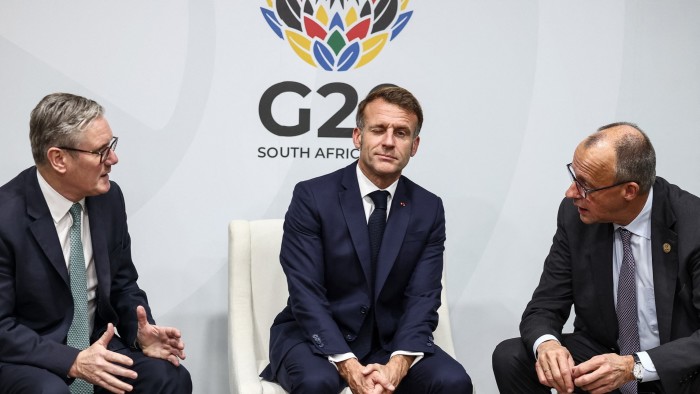Unlock the White House Watch newsletter for free
Your guide to what Trump’s second term means for Washington, business and the world
Ukraine’s western allies have called for “additional work” on a US-Russia peace plan and for the EU and Nato to be given a say over its contents as they seek to delay the terms being forced on Kyiv.
The 14 leaders, from countries that include European states plus Japan, Australia and Canada, said on Saturday that the “initial draft of the 28-point plan includes important elements that will be essential for a just and lasting peace”, in a joint statement agreed at an emergency meeting in Johannesburg.
“We believe therefore that the draft is a basis which will require additional work,” the leaders said. “We reiterate that the implementation of elements relating to the European Union and relating to Nato would need the consent of EU and Nato members respectively.”
The meeting on the sidelines of the G20 summit was called in response to a demand from Donald Trump’s administration that Ukraine agree to the 28-point proposal by next Thursday. US officials warned that there was little room to negotiate on a plan described by European officials as a “capitulation” to Moscow.
Separately, Rustem Umerov, secretary of Ukraine’s national security and defence council, said on Saturday that he was “beginning consultations between senior officials of Ukraine and the United States regarding possible parameters of a future peace agreement” in Switzerland.
The meeting, he said on Telegram, marks “another stage of the dialogue that has been ongoing in recent days and is primarily intended to co-ordinate our vision of the next steps”.
National security advisers from other European capitals and the European Commission will also hold talks in Geneva on Sunday, three officials told the Financial Times, to try to influence the negotiations.
European diplomats said that the peace plan — drawn up with Russian input and without consultation with Nato allies — and Trump’s ultimatum have created the most pivotal moment in the almost four-year war, and pose a huge test for Kyiv’s western allies.
Attempts to forge a joint stance in response have been spearheaded by German Chancellor Friedrich Merz, French President Emmanuel Macron and UK Prime Minister Keir Starmer. The frantic diplomatic negotiations have been complicated by a desire not to directly criticise Trump, officials said.
“We welcome the continued US efforts to bring peace to Ukraine,” the leaders said. “We are ready to engage in order to ensure that a future peace is sustainable.”
“We are clear on the principle that borders must not be changed by force. We are also concerned by the proposed limitations on Ukraine’s armed forces, which would leave Ukraine vulnerable to future attack.”
In addition to Merz, Macron and Starmer, the statement was signed by the leaders of Italy, Norway, Spain, the Netherlands, Finland, Ireland, Japan, Australia and Canada, and the presidents of the EU Council and European Commission.
Speaking after the meeting, Merz told reporters: “Wars cannot be ended by great powers over the heads of the affected countries,” adding that any solution must involve the consent of Ukraine and Europe.
“If Ukraine were to lose this war and then, most probably, collapse, that would also have consequences for the whole of European politics,” he said.
The US has warned Kyiv that if it does not agree to the plan, which demands that Ukraine relinquish territory, pledge never to join Nato and shrink its armed forces, it risks losing critical military and intelligence support.
Ukraine’s President Volodymyr Zelenskyy said the choice was between “either loss of dignity or the risk of losing a key partner”, and that his country faced “one of the most difficult moments in our history”.
Recommended
Saturday’s meeting followed a flurry of bilateral discussions that went on into Friday evening featuring Macron, Starmer, European Commission President Ursula von der Leyen and others, amid fears that the US was pushing ahead so fast with the plan that European capitals could not form a credible response to it.
At a volatile meeting in Kyiv on Friday evening, US army secretary Daniel Driscoll told European ambassadors and western officials that Washington was “not negotiating details”. He added that “we need to get this shit done”, according to people present who described his presentation as “nauseating” and “shocking”.
The official negotiating team formed by President Volodymyr Zelenskyy and dispatched to Geneva overnight is headed by his powerful and controversial chief of staff Andriy Yermak, according to a presidential decree seen by the FT.
Separately on Saturday, the 19 nations attending the opening of the G20 summit in Johannesburg signed a joint statement saying that in the face of a “challenging political and socio-economic environment”, they endorsed a “belief in multilateral co-operation”.
Washington had warned countries not to sign a declaration after Trump announced that the US would boycott the gathering.
Additional reporting by Laura Pitel in Berlin and Monica Mark in Johannesburg


